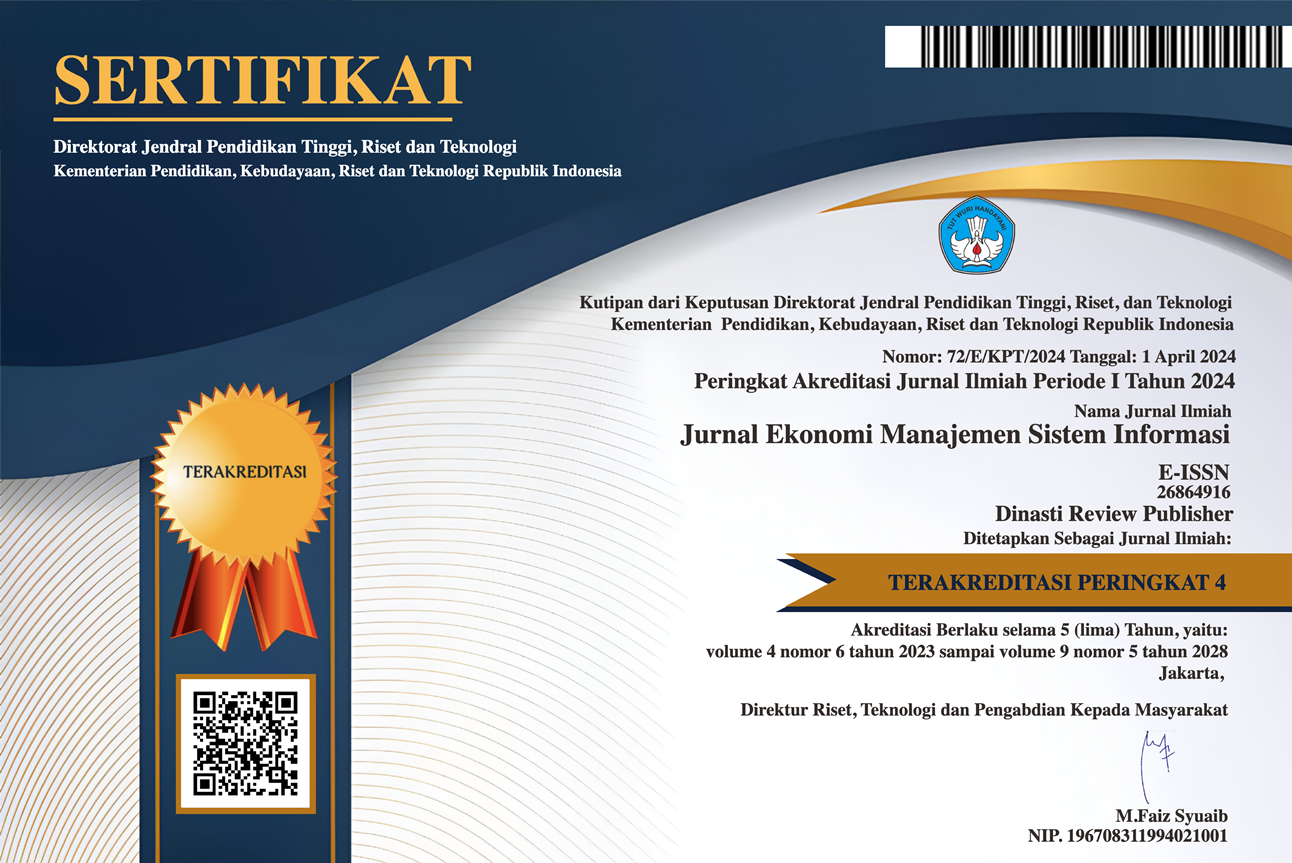Gen Z and the Future of Work: Adapting HRM Strategies for A Digital Workforce
DOI:
https://doi.org/10.38035/jemsi.v6i3.4053Keywords:
Generasi Z, Manajemen SDM, Rekrutmen, Retensi, Future of WorkAbstract
Generasi Z, dengan karakteristik dan ekspektasi unik sebagai digital native, menghadirkan tantangan dan peluang baru dalam dunia kerja. Artikel ini mengkaji strategi manajemen sumber daya manusia (SDM) yang adaptif untuk menarik, mempekerjakan, dan mempertahankan talenta Generasi Z di era digital. Melalui tinjauan teoritis dan studi kasus, artikel ini menganalisis tantangan dan merumuskan solusi dalam berbagai aspek, meliputi employer branding, rekrutmen, pengembangan karir, lingkungan kerja, kompensasi dan benefit, serta peran kepemimpinan. Hasilnya menunjukkan pentingnya strategi yang inovatif dan berorientasi masa depan untuk memenuhi kebutuhan Generasi Z, menciptakan lingkungan kerja yang positif dan memberdayakan, serta mencapai keunggulan kompetitif.
References
Abadi, F., & Perkasa, D. H. (2020). Analysis of Job Training, Compensation and Engagement on Job Effectiveness. 191–195. https://doi.org/10.2991/AEBMR.K.200205.035
Oluwatosin Abdul-Azeez, Alexsandra Ogadimma Ihechere, & Courage Idemudia. (2024). Transformational leadership in SMEs: Driving innovation, employee engagement, and business success. World Journal of Advanced Research and Reviews, 22(3), 1894–1905. https://doi.org/10.30574/wjarr.2024.22.3.1888
Acheampong, N. A. A. (2021). Reward Preferences of the Youngest Generation: Attracting, Recruiting, and Retaining Generation Z into Public Sector Organizations. Compensation & Benefits Review, 53(2), 75–97. https://doi.org/10.1177/0886368720954803
Adams, J. S. (1965). Inequity In Social Exchange. Advances in Experimental Social Psychology, 2(C), 267–299. https://doi.org/10.1016/S0065-2601(08)60108-2
Burnett, J. R., & Lisk, T. C. (2021). The future of employee engagement: Real-time monitoring and digital tools for engaging a workforce. … Perspectives on Employee Engagement. https://doi.org/10.4324/9781003142492-9
Cennamo, L., & Gardner, D. (2008). Generational differences in work values, outcomes and person?organisation values fit. Journal of Managerial Psychology, 23(8), 891–906. https://doi.org/10.1108/02683940810904385
Pyöriä, P., Ojala, S., Saari, T., & Järvinen, K.-M. (2017). The Millennial Generation. Sage Open, 7(1), 307–321. https://doi.org/10.1177/2158244017697158
Chillakuri, B. (2020). Understanding Generation Z expectations for effective onboarding. Journal of Organizational Change Management, 33(7), 1277–1296. https://doi.org/10.1108/JOCM-02-2020-0058
Claire Hastwell. (2023, March 3). Creating a Culture of Recognition | Great Place To Work®. https://www.greatplacetowork.com/resources/blog/creating-a-culture-of-recognition
Deloitte. (2018). Welcome to Gen Z.
Deloitte. (2024). The Deloitte Global 2024 Gen Z and Millennial Survey. https://www.deloitte.com/global/en/issues/work/content/genz-millennialsurvey.html
Dorsey, J. R., & Villa, D. (2020). Zconomy: How Gen Z Will Change the Future of Business—and What to Do About It. HarperCollins. https://books.google.co.id/books?id=DIK0DwAAQBAJ
Franciska, F., Magito, M., & Perkasa, D. H. (2023). ANALISIS PENGARUH PENGEMBANGAN KARIR, KEPUASAN KERJA, DAN MOTIVASI KERJA TERHADAP KINERJA KARYAWAN PADA PT. ARTA BOGA CEMERLANG JAKARTA. Mufakat: Jurnal Ekonomi, Manajemen Dan Akuntansi, 2(3), 202–218. https://doi.org/10.572349/mufakat.v2i3.738
Glints. (2023, October 30). 9 Perusahaan Indonesia yang Terapkan WFA Permanen - Glints Blog. https://glints.com/id/lowongan/perusahaan-yang-wfa-permanen/
Hikmah Perkasa, D., Dhyan Parashakti, R., Nur Affini, D., Endah Retno Wuryandari, N., Deswindi, L., & Author, C. (2023). Analysis of Factors Influencing Turnover Intention of Go Online’s Employees. Dinasti International Journal of Education Management And Social Science, 4(3), 362–373. https://doi.org/10.31933/DIJEMSS.V4I3.1675
Hikmah Perkasa, D., Harbiato, F., Al Faruq, M., Endah Retno Wuryandari, N., & Nina Rostini, C. (2023). The Influence of Recruitment, Training, and Motivation Systems on Employee Performance Bank Mandiri Latumentten Branch West Jakarta. KnE Social Sciences, 2023, 89–103. https://doi.org/10.18502/kss.v8i12.13654
Horodyski, P. (2023). Applicants’ perception of artificial intelligence in the recruitment process. Computers in Human Behavior Reports, 11, 100303. https://doi.org/10.1016/J.CHBR.2023.100303
IDN Research Institute. (2024). Indonesia Gen Z Report 2024?: Understanding and Uncovering the Behavior, Challenges, and Opportunities.
Janssen, D., & Carradini, S. (2021). Generation Z Workplace Communication Habits and Expectations. IEEE Transactions on Professional Communication, 64(2), 137–153. https://doi.org/10.1109/TPC.2021.3069288
Jayathilake, H. D., Daud, D., Eaw, H. C., & Annuar, N. (2021). Employee Development and Retention of Generation-Z Employees in the Post-Covid-19 Workplace: A Conceptual Framework. Benchmarking an International Journal, 28(7), 2343–2364. https://doi.org/10.1108/bij-06-2020-0311
Jobstreet Singapore. (2022, October 14). Gen Z Career Development Guide. https://sg.jobstreet.com/career-advice/article/gen-z-career-development-guide
Kirchmayer, Z., & Fratri?ová, J. (2020). What motivates generation Z at work? Insights into motivation drivers of business students in Slovakia. Innovation Management and Education Excellence through Vision 2020. https://www.researchgate.net/profile/Zuzana-Kirchmayer/publication/324797364_What_Motivates_Generation_Z_at_Work_Insights_into_Motivation_Drivers_of_Business_Students_in_Slovakia/links/5b8e9796a6fdcc1ddd0e3430/What-Motivates-Generation-Z-at-Work-Insights-
Kowske, B. J., Rasch, R., & Wiley, J. (2010). Millennials’ (lack of) attitude problem: An empirical examination of generational effects on work attitudes. Journal of Business and Psychology, 25(2), 265–279. https://doi.org/10.1007/S10869-010-9171-8/METRICS
Lazányi, K., & Bilan, Y. (2017). GENERATION Z ON THE LABOUR MARKET – DO THEY TRUST OTHERS WITHIN THEIR WORKPLACE? Polish Journal of Management Studies, 16(1), 78–93. https://doi.org/10.17512/pjms.2017.16.1.07
Lestari, D. P. (2023). Generation Z Work Motivation in Indonesia. Return Study of Management Economic and Bussines, 2(4), 409–422. https://doi.org/10.57096/return.v2i04.95
Loop Indonesia. (2023, October 19). Peran Coaching dalam Pengembangan Potensi Generasi Z. https://www.loop-indonesia.com/membimbing-generasi-z-menuju-sukses-peran-coaching-dalam-pengembangan-potensi-mereka/
Lyons, S., & Kuron, L. (2014). Generational differences in the workplace: A review of the evidence and directions for future research. Journal of Organizational Behavior, 35(S1), S139–S157. https://doi.org/10.1002/JOB.1913
Macovei, C. M., & Martinescu-B?d?lan, F. (2022). Managing Different Generations in the Workplace. International Conference KNOWLEDGE-BASED ORGANIZATION, 28(2), 191–196. https://doi.org/10.2478/kbo-2022-0071
Maslow, A. H. (1943). A theory of human motivation. Psychological Review, 50(4), 370–396. https://doi.org/10.1037/H0054346
Mekari Talenta. (2024, March 20). Leader, Begini Kunci Kuat Budaya Perusahaan di Astra – Mekari Talenta. https://www.talenta.co/blog/budaya-perusahaan-astra/
Nedelko, Z., Peleckien?, V., Peleckis, K., Peleckis, K. K., Lapinskien?, G., & Potocan, V. (2022). GENERATION Z AND ETHICALITY OF ADVANCEMENT IN THE WORKPLACE: A STUDY OF SLOVENIA AND LITHUANIA. Journal of Business Economics and Management, 23(2), 482–506. https://doi.org/10.3846/jbem.2022.16824
Nurqamar, I. F., Ulfa, S., Hafizhah, I., Fadhillah, N., & Rahmi, N. (2022). The Intention of Generation Z To Apply For a Job. JBMI (Jurnal Bisnis, Manajemen, Dan Informatika), 18(3), 218–247. https://doi.org/10.26487/jbmi.v18i3.16493
Oxford Management Center. (2023, August 9). The Difference Between OKR and KPI. https://oxford-management.com/articles/the-difference-between-okr-and-kpi
Parry, E., & Urwin, P. (2011). Generational Differences in Work Values: A Review of Theory and Evidence. International Journal of Management Reviews, 13(1), 79–96. https://doi.org/10.1111/j.1468-2370.2010.00285.x
Sugiyono, Prof. Dr. (2014). Metode Penelitian kuantitatif, kualitatif dan R & D . Alfabeta.
Sujansky, J. G., & Ferri-Reed, J. (2009). Keeping the Millennials: Why Companies are Losing Billions in Turnover. https://www.wiley.com/en-us/Keeping+The+Millennials%3A+Why+Companies+Are+Losing+Billions+in+Turnover+to+This+Generation-+and+What+to+Do+About+It-p-9780470438510
Taylor, P. Ed., & Keeter, S. Ed. (2010). Millennials: Confident. Connected. Open to Change. Pew Research Center.
Tempo.co. (2024, October 23). Astra Prioritaskan Rekrut Gen Z Sebagai Karyawan | tempo.co. https://www.tempo.co/ekonomi/astra-prioritaskan-rekrut-gen-z-sebagai-karyawan-1096407
Turner, A. (2015). Generation Z: Technology and Social Interest. The Journal of Individual Psychology, 71(2), 103–113. https://doi.org/10.1353/jip.2015.0021
Tussing, T. E., Chipps, E., & Tornwall, J. (2024). Generational Differences in the Nursing Workforce: Strategies for Nurse Leaders. Nurse Leader, 22(5), 602–608. https://doi.org/10.1016/J.MNL.2024.03.007
Twenge, J. M. (2017). iGen: Why Today’s Super-Connected Kids Are Growing Up Less Rebellious, More Tolerant, Less Happy--and Completely Unprepared for Adulthood--and What That Means for the Rest of Us. Atria Books. https://books.google.co.id/books?id=HiKaDQAAQBAJ
Ver?i?, A. T. (2021). The impact of employee engagement, organisational support and employer branding on internal communication satisfaction. Public Relations Review. https://www.sciencedirect.com/science/article/pii/S0363811121000011
Vieira, J. (2024). Talent Management and Generation Z: A Systematic Literature Review Through the Lens of Employer Branding. Administrative Sciences, 14(3), 49. https://doi.org/10.3390/admsci14030049
Vroom, V. H. (1964). Work and Motivation. Wiley. https://books.google.co.id/books?id=BdqRAAAAIAAJ
Waworuntu, E. C., Kainde, S. J. R., & Mandagi, D. W. (2022). Work-Life Balance, Job Satisfaction and Performance Among Millennial and Gen Z Employees: A Systematic Review. Society, 10(2), 384–398. https://doi.org/10.33019/society.v10i2.464
WEF. (2020). The Future of Jobs Report 2020 | World Economic Forum. https://www.weforum.org/publications/the-future-of-jobs-report-2020/
Ya?mur, Y. (2024). An Exploratory Research to Reveal the Habits, Motivations, and Tendencies of Generation Z to Use Social Media Platforms as a Leisure Activity. Advances in Hospitality and Tourism Research (Ahtr), 12(2), 172–199. https://doi.org/10.30519/ahtr.1452356
Yosepina. (2024, June 22). Gen Z dan KPI: Transformasi Dunia Kerja di Bidang SDM. Kompasiana.Com. https://www.kompasiana.com/gabriela3875/66761e2034777c38e2541d12/gen-z-dan-kpi-transformasi-dunia-kerja-di-bidang-sdm
Downloads
Published
How to Cite
Issue
Section
License
Copyright (c) 2025 Muhammad Amrullah, Didin Hikmah Perkasa, Rahmat Edward

This work is licensed under a Creative Commons Attribution 4.0 International License.
Hak cipta :
Penulis yang mempublikasikan manuskripnya di jurnal ini menyetujui ketentuan berikut:
- Hak cipta pada setiap artikel adalah milik penulis.
- Penulis mengakui bahwa Jurnal Ekonomi Manajemen Sistem Informasi (JEMSI) berhak menjadi yang pertama menerbitkan dengan lisensi Creative Commons Attribution 4.0 International (Attribution 4.0 International CC BY 4.0) .
- Penulis dapat mengirimkan artikel secara terpisah, mengatur distribusi non-eksklusif manuskrip yang telah diterbitkan dalam jurnal ini ke versi lain (misalnya, dikirim ke repositori institusi penulis, publikasi ke dalam buku, dll.), dengan mengakui bahwa manuskrip telah diterbitkan pertama kali di Jurnal Ekonomi Manajemen Sistem Informasi (JEMSI).










































































